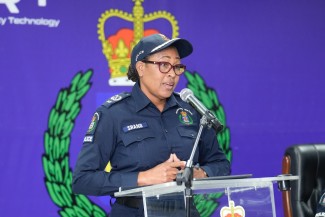JCF, ODPEM and JFB - Service without fanfare

While we celebrate the first step towards legislation to protect older people, the need is so urgent that a committee was recently convened by the seniors advocacy organization, CCRP with representatives of leading Government organizations. We discovered that Assistant Commissioner of Police Charmaine Shand, Deputy Superintendent of Police Jacqueline Dillon, Garran Diviney of the ODPEM Training Division and Jay Scott of the Investigative Branch of the Jamaica Fire Brigade have been serving Jamaica’s elderly without any fanfare.
ACP Shand, head of the JCF Community Safety & Security Branch noted, “Some of the challenges that I see is that [the elderly] really are left on their own by their communities. We have urged family or neighbours to assist them when they visit clinics.” She said that sometimes they are hurt on the road, and the police have difficulty in contacting family members. The JCF has been assisting CCRP in our outreach activities, distributing care packages to the needy elderly in volatile inner-city areas.
ACP Shand shared that the JCF has Community & Safety Officers in every Division and would be happy to participate in meetings with stakeholders to have oversight of our vulnerable elderly to ensure that they are not left on their own.
Free background checks
DSP Jacqueline Dillon called for more sensitization of the elderly to our changing society and equipping them with basic tools for alertness and safety. “They do not recognize that they are now in a vulnerable situation,” she said, offering that the Community & Safety Branch would be happy to come on board to participate in regular engagements. She also reminded us that the JCF is available to do background checks, which she encourages when hiring caregivers. This she says is a free service, as are all other services of the Force.
Garran Diviney noted that as a training officer at ODPEM, he has been visiting communities and notices the elderly being alone and isolated, alienated by the community. “I have advised that you can simply stop and check on the person. Knock and ask, ‘Are you there? Are you okay?” In the case of the mummified person reported recently, it wasn't shocking based on what I have heard, because it's a common thing, especially in Kingston and urban areas where people are so caught up in getting to work, getting things done, getting around. They don't think, ‘Oh, Miss Jane, I haven’t seen her in a month.’ Even our own parents and grandparents - we neglect to check in on them so that is what I have been advising persons to do in my sensitizations.”
Emergency planning
Diviney urged that in developing emergency plans, check on your vulnerable relatives and neighbours, where they may be sheltering during a storm. He noted that sometimes we are more protective of elderly women, but we should also look out for elderly men, do a wholistic check on those in your community who may need help. “We should identify and address their needs before there is a disaster or an emergency,” he urged. He is encouraging retired persons to stay engaged with community groups and to build their capacity for safety and security, for example, modifying their homes for greater safety.
The Jamaica Fire Brigade’s Jay Scott emphasised careful planning – early warning systems in case of a fire. He believes that homes and care homes should be equipped with smoke alarms and fire extinguishers.
“I think it’s important to start with education,” he suggested, noting that in the case of the elderly wishing to remain independent, they can be assisted in making their spaces safer. He recommended that we work with Kevin Haughton, head of the Fire Prevention Department of the JFB to have safety workshops with the elderly. We resolved to contact fire safety companies to see their assistance in offering discounts and installing smoke alarms in the homes of elderly folks living on their own. He reminded us that the JFB stands ready to make fire safety checks at any location, so if any citizen has a concern for a senior living alone or in a care home, they will promptly schedule an inspection.
The pride factor
Chair of the CCRP Caring Committee Erica P. Harris, said that pride can be an issue when the elderly do not ask for help. As someone living in a multi-generational household, she said that one should try to understand our elders’ needs even if they remain unsaid.
“So one of the things I've tried to do in instances like that is to just listen keenly,” she said, “so if there is a need, they have the opportunity to talk to me about it. This takes time as you need to build a relationship and have that rapport for them to feel comfortable. And you have to show up because … they need to know that they can rely on you … establishing that trust is important for them to want to ask for the help.”
We discussed the matter of trust as the majority of financial abuse cases involve family members. She said she had seen elders put into sub-standard homes and being robbed of their pension funds. Erica suggested an external source of protection. That is an important call for all the stakeholders involved. We noted that the National Council for Senior Citizens (NCSC) had been assigning social workers to cases brought to their attention and their regular events promoting social interaction.
Retirees being exploited
Our CCRP Board Director Patricia Reid Waugh, who is a chartered accountant and retirement coach, reflected on uncaring family members who, having been funded and housed, turn their backs on their elders, once they become financially independent. She said there are retirees who are eroding their pensions by taking on financial responsibilities for children and even grandchildren. She said we should address young people on their moral responsibility to their elderly family members.
We regretted the absence of the Umbrella Group of Churches’ representative and will be writing to our church groups to initiate a system of investigation and registration to deter fake ‘parsons’ who have been endangering and ripping off our elderly. Our churches have been built and supported by our elders – they deserve every protection in their later years.
Do you have a will?
In another session last week, we learned about estate planning and trust management from former Administrator General Lona Brown and Alicia Hussey of Hussey Legal. Ms. Hussey outlined the essential elements of a valid will, emphasizing that it must be in writing, signed by the testator (or someone acting under their direction in their presence), and witnessed by two individuals who are present at the same time.
Lona Brown highlighted the role of trusts in protecting and managing assets for intellectually challenged or dependent family members. Noting that the establishment of a company can also be a strategic tool in estate planning, seniors are encouraged to seek legal advice on the possibility of setting up a venture to continue legacy protection.
